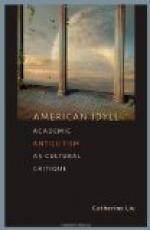He wrote, after visiting Swift’s plant, of “seeing illustrations for all the lectures on technique I have given, and Gee! it felt good. [I could not quote him honestly and leave out his “gees”] to actually look at things being done the way one has orated about ’em being done. The thing for me to do here is to see, and see the things I’m going to write into my thesis. I want to spend a week, if I can, digging into the steel industry. With my fine information about the ore [he had just acquired that], I am anxious to fill out my knowledge of the operation of smelting and making steel. Then I can orate industrial dope.” Later: “This morning I called on the Vice-President of the Illinois Steel Company, on the Treasurer of Armour & Co., and lunched with Mr. Crane of Crane Co.—Ahem!”
The time we had when it came to the actual printing of the thesis! It had to be finished by a certain day, in order to make a certain steamer, to reach Heidelberg when promised. I got in a corner of a printing-office and read proof just as fast as it came off the press, while Carl worked at home, under you can guess what pressure, to complete his manuscript—tearing down with new batches for me to get in shape for the type-setter, and then racing home to do more writing. We finished the thesis about one o’clock one morning, proof-reading and all; and the next day—or that same day, later—war was declared. Which meant just this—that the University of Heidelberg sent word that it would not be safe for Carl to send over his thesis,—there were about three or four hundred copies to go, according to German University regulations,—until the situation had quieted down somewhat. The result was that those three Or four hundred copies lay stacked




